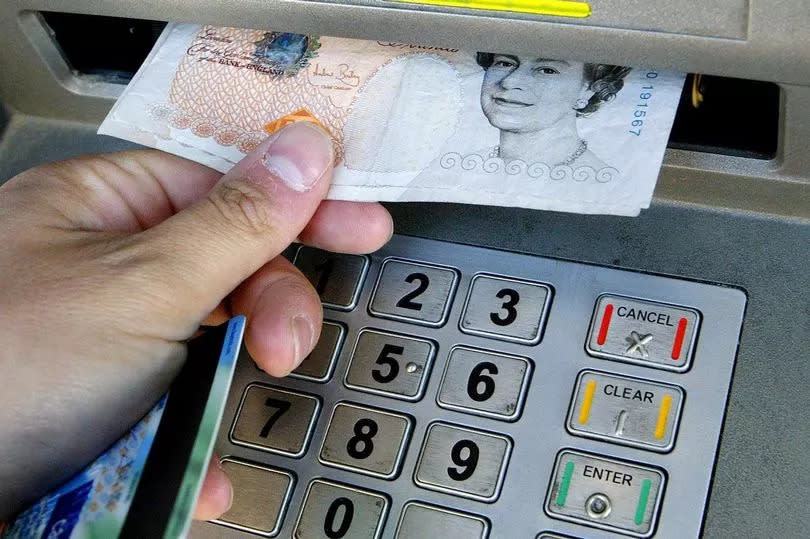'I quit the NHS to be a sex worker. Why can't I have a bank account?'

Living in an almost cashless society, most of us are familiar with that helpless feeling whenever we misplace our bank cards.
Having no access to cash is a stressful experience, especially for those who have been locked out of their account for fraud prevention reasons.
Now imagine having to endure that every single day - knowing you could have your account frozen or shut down at any given moment without notice.
Join our WhatsApp Top Stories and Breaking News group by clicking this link
That's a reality Amy Walton has lived since entering the sex industry seven years ago, so far having her bank accounts either frozen, closed or denied at total of 15 times.
Amy, not her real name, claims she’s suffered constant issues with her bank accounts since she started escorting in 2017, believing she's being unfairly targeted for her line of work.
The 39-year-old, from Wigan, first began lap dancing while studying at university to earn a bit of extra cash.
The mum-of-six then started escorting in her spare time, a service where clients pay for companionship, alongside working as an NHS sonographer.
But before long, Amy began experiencing issues with her bank accounts, claiming she was suddenly being quizzed over her transactions.
The mum alleges she had her personal account closed down once she disclosed her new line of work.
And although she managed to open a business account, the mum says she spent years being “scrutinised” over her transactions while “constantly” being asked for extra information.
Amy says things got even worse in 2021, when she decided to quit the NHS to focus on escorting full time.
“The past three years it’s been ridiculous,” she told the Manchester Evening News. “I’ve even struggled to open business and personal bank accounts.
“People ask me why I openly say what I do, but why shouldn’t I? If I ask the banks why they’ve shut my account, they say they don’t have to tell me but they’ve followed guidelines.
“I know what it is though because when I’ve applied for business bank accounts and said the nature of my job, it won’t let me go further with applications.”
Sex work is legal in the UK but it is illegal to run a brothel, be a pimp or to solicit customers for sex work in public.
But despite this, Amy says the bank interventions make her feel like an 'abusive criminal' – believing she’s being unfairly discriminated against because of the nature of her job.

She added the sudden and last-minute interferences have a huge impact on her life, saying she once couldn’t access her account holding her son's benefit payment for more than a week.
“They have this idea that we’ve been forced into the industry,” Amy continued. “They say we’re victims but they close our accounts.
“If they say we’re victims, they should be doing things to benefit us and help us. If anything, it pushes people further. At the end of the day, people are going down a dark road because of the banks.
“It’s forcing people to lie about what we do. I’ve heard girls say they get their money paid into someone else's account. They’re putting themselves at risk doing that.
“My son’s child benefit was in my bank account that was closed down by Barclays. It was horrendous.”
Amy says her accounts are often frozen when direct debits are due, sometimes seeing her charged up to £30 for late payments, and having to wait until the account is unfrozen to see exactly what payments have been missed.
She describes finding herself stranded at a petrol station for two hours on an occasion when her bank account was locked without notice, meaning she was unable to pay for her petrol.
“I’m registered with HMRC,” she added. “I pay tax. This is what frustrates me; I don’t understand what problem they’ve got with people putting money through a bank.
“Would they rather people hide it under a bed? How can HMRC not have a problem with me but the banks have?
“I got a business bank account but it was frozen when they said they wanted to know more about my business.
“They asked me about three incoming pending transactions asking what they were for. They asked me for invoices from my customers and I was honest and said I couldn’t do that. As soon as I said that, they closed my account. I don’t understand what the problem is.
“You’re taking away something that someone needs to pay taxes and be a law-abiding citizen. It’s just getting to the point where I don’t know what their end goal is.”
Amy says she currently has a Barclays Bank account which is set to close on May 20. She believes she has been de-banked, a term also known as de-risking, where banks close accounts because they believe customers pose regulatory, legal, financial or reputational risks to the institution. De-banking is commonly seen among those in the sex industry.
Approached by the M.E.N, a Barclays spokesperson said: “We are unable to comment on specific account details without the customers consent.”
Meanwhile, Amy says she's now running out of options. “I've used so many banks,” she added. “I can’t have any other bank account.
“It’s horrendous. It affects me massively because a lot of my work is bank transfer. I don’t take a lot of cash.
“It’s a good job I have a good family, because I have to borrow money. It’s the stress it brings.
“I have to wait for my bank to be unfrozen and go on to see which transactions have failed. It’s totally unfair. I’ve had times where I’ve had to borrow money to pay for things for the kids.
“Once I was in Asda and I went to use the card to pay for a full shop and it was frozen and I couldn’t pay for it. It’s embarrassing.
“I get that sinking feeling thinking, 'they’ve done it again'. There’s been times where I’ve thought 'I can’t do this job anymore'.
“That’s why I launched the petition – I want to shine a light on the injustice.”
Amy decided to raise the plight of sex workers by launching an official petition, asking the Government to review current laws to ensure those who work in the sex industry can access banking services.
Although there were a few thousand signatories to the petition, it was struggling to reach the 10,000 signature point where the Government is mandated to issue a response.
That's when the sex-positive platform MintStars stepped in to help, and, with extra publicity, the petition smashed the 10,000 signature barrier. The UK-based adult fan site says it was launched to give more financial control to those who create content on the site.
Co-founder Jessica Van Meir, 28, worked at the law firm which prosecuted the first successful case against image-based sexual abuse, colloquially known as revenge porn, in the UK. She is a former Gates Cambridge Scholar who is now researching sex workers’ rights at Harvard.
She said: "Freezing people out of the banking system is wrong and problematic on so many levels.
“Firstly, it forces them either to exist on a cash-only basis – potentially forcing online creators to turn to riskier in-person sex work and making investing their savings to keep up with inflation impossible – or to rely on third-party platforms which take a huge cut of their earnings. Sex workers essentially face a double taxation.
“Secondly, those being frozen out are more likely to come from a vulnerable background. The vast majority of sex workers are women, trans or non-binary people, often mothers trying to put food in front of their families.
“Last month, MPs on the APPG on Fair Business Banking condemned banks for de-banking customers in industries such as jewellers, cryptocurrency and yacht brokers. But while businesses in these industries may take a profit hit from de-banking, sex workers face far worse consequences, potentially falling victim to trafficking or homelessness.
“The Treasury’s response to the de-banking petition, which does not even acknowledge sex workers, is apathetic at best, and cruel. In failing to recognise that banks are not playing by the rules, the Government is condemning tens of thousands more people into living without access to the most basic financial services, including bank accounts, loans and mortgages.

“Additionally, businesses which serve sex workers are not eligible for the basic bank accounts which the Government mentioned. We as a business have had applications denied by multiple UK banks even though we operate in a completely legal industry.”
What the authorities say:
By looking at information supplied by banks, building societies and payment companies, a recent investigation by the Financial Conduct Authority, coming after the Nigel Farage de-banking scandal, found that no firm closed an account between July 2022 and June 2023 primarily because of a customer’s political views. The body says Payment Accounts Regulations ban banks or building societies discriminating on this basis.
However, the FCA says it will be doing further work with firms to verify the data and to better understand the reasons behind, for example, the closure of accounts due to reputational risk.
It said by far the most common reasons providers gave for closing, suspending or declining an account was because it was inactive/dormant or because there were concerns about financial crime.
In its review, the FCA noted that unlike other jurisdictions, there is no right to an account in the UK and some protections, for example the anti-discrimination measures in the Payment Accounts Regulations, do not apply to businesses, charities, political parties and civil society organisations.
Nikhil Rathi, FCA Chief Executive, commented: "While no bank, building society or payment firm reported to us that they had closed accounts primarily due to someone’s political views, further work is needed for us to be sure.
"As we undertake that work, the time is also right for a debate on how we balance access to bank accounts with the threat of financial crime, as well as firms’ reasonable risk and commercial appetites. An important question for policy makers is whether all individuals, businesses and organisations should have the right to an account, as is the case in some other countries.
"What’s more, international comparisons suggest robust digital identities could play an important role not only in countering financial crime but also in aiding financial inclusion."
In a bid to combat this issue, the FCA said it will carry out follow-up checks, take closer looks at accounts closed for reasons of reputational risk, review declined applications and terminated bank accounts, research why 1.1m in the UK are unbanked and engage with consumers to understand the impact of account declines, terminations and suspensions.

We asked HM Treasury about Amy's case and the difficulties sex workers might face with banking, and they pointed us to their statement in response to her petition.
They said: “HM Treasury has designated the largest current account providers to offer basic bank accounts – personal current accounts with no overdraft or fees – to eligible UK residents with no bank account.
“The Government seeks to ensure everyone can access useful financial products and services. As part of this, we recognise that banks and building societies occupy a privileged position in society and are essential to enabling people and businesses to manage their money.
“Credit institutions, covering all UK banks and building societies, cannot deny UK consumers access to personal payment accounts based on a range of protected characteristics.
“For individuals having difficulty opening a personal bank account, the nine largest personal current account providers in the UK must offer fee-free basic bank accounts to “unbanked” customers. This means everyone can manage their money effectively, securely, and confidently. As of June 2022, there were 7.4 million basic bank accounts.
“The Government is also increasing customer protections. The minimum notice providers must give before closing an account will increase from two months to 90 days, so people have time to deal with, or challenge, this decision. Firms will also need to provide a sufficiently detailed and specific explanation to customers, increasing transparency.
“The Money Laundering Regulations apply to regulated firms, including banks. These ensure key professionals identify their customers and understand a transaction’s purpose, including the source of funds. These risk-based checks help firms identify and report suspicions of money laundering linked to crimes such as human trafficking and modern slavery.
“The availability of lending products, such as mortgages or credit cards, and decisions about offering services to businesses are commercial decisions in which the Government does not intervene. The Government will regulate only where there is a clear case to do so, to avoid increasing costs for providers that could ultimately lead to higher costs for customers.
“The mortgage and consumer credit markets are principally overseen by the Financial Conduct Authority (FCA). The FCA’s rules do not prevent lenders from lending to any potential borrower, including self-employed customers, as long as it is affordable, and the borrower’s income can be shown to be sustainable.
“If personal or business customers are unhappy with a firm’s handling of their affairs, they may be able to make a complaint to the Financial Ombudsman Service (FOS), which provides swift and effective dispute resolution with financial services firms. The FOS can direct firms to put things right, including reinstating closed accounts or providing compensation.”

 Yahoo News
Yahoo News 
